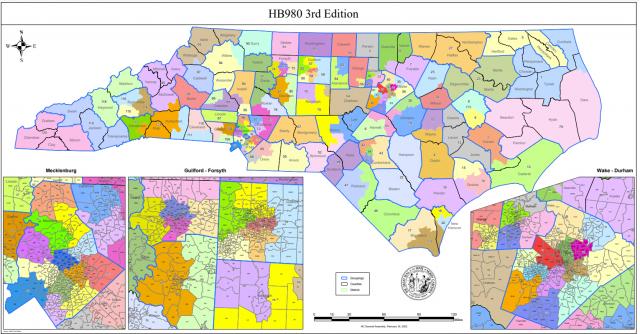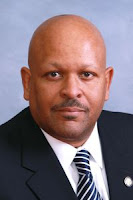If 2018 was "the Blue Wave" year, 2022 might be the blue-in-the-face year. Whereas every state House and Senate race had a Democratic contender in 2018, this year some 28 House seats (out of 120) have no Democratic candidates, and it's worse in the Senate, where 13 seats (out of 50) will plop into Phil Berger's pocket uncontested by Dems. If you love math (as I don't), that's 23% of the House and 26% of the Senate, where the Democrats aren't even playing.
To be fair here, the Republicans fell down too in candidate recruitment, but only in 9 House Districts, where no Republican thought it a good use of time and treasure to challenge incumbent Democrats Allison Dahle, Vernetta Alston, Zach Hawkins, Abe Jones, Pricey Harrison, and John Autry. Three other open House seats with no Republican on the ballot have 2- and 3-way primaries among Democrats to take an otherwise safe Democratic seat -- Cumberland (Dist. 44), Orange (Verla Insko's HD56), and Forsyth (HD71). Total of 13 House seats where no Republican filed.
 |
| NC House Districts. For a larger map, go here. |
(For sure, I'll be taking a closer look at those three Democratic primaries. Later.)
On the Senate side, Republicans failed to recruit anyone to challenge Democratic incumbent Mujtaba Mohammed in Dist. 38 (Mecklenberg), but that is the only Senate race conceded to the Dems. All others have Republican candidates.
 |
| NC Senate Districts. For a larger map, go here. |
Democrats failed to show too often, and when they did show, they sometimes piled on in districts where incumbent Democrats were already running for reelection. Debilitating primaries. Why is Kirk DeViere, elected in the 2018 Blue Wave, now facing not one but two fellow Democrats? What did Kirk DeViere do to earn this brutality? Same for Graig Meyer in the 23rd SD and Julie Mayfield in the 49th, down in Buncombe. What did they do to deserve a primary in a year Democrats are already stressed and stretched?
(I'm focussing on NC House and Senate in this post, but I also noticed a regrettable 5-way primary for US Congress in the NC13, where out of the blue and on the last day of filing, former state Senator Sam Searcy added his name to the ballot. Searcy was first elected to the NC Senate by a very narrow margin in 2018, defeating incumbent Republican Tamara Barringer (who's now on the NC Supreme Court). Blue Wave, indeed. Searcy was reelected in 2020, served a little over 30 minutes (almost literally true) and then resigned "in order to take a new position serving the people of NC, which he did not specify" [Wikipedia]. And so far as I know, never has specified. That broken promise reminded me that before Searcy decided to ran against Barringer in 2018, he had been all in to run for Congress against incumbent Republican George Holding. Then without warning, he dropped that race and pursued the NC Senate seat instead. Seems kinda flighty, that guy.)
FOOTNOTE
Senate districts, no Dem: #1, #2, #6, #8, #9, #26 (Phil Berger), #31, #35, #36, #37, #43, #44, #47
House districts, no Dem: #1, #3, #7, #10, #16, #19, #22, #46, #52, #55, #67, #68, #75, #76, #77, #79, #83, #86, #89, #90, #91, #96, #97, #108, #110, #111, #113, #120





























